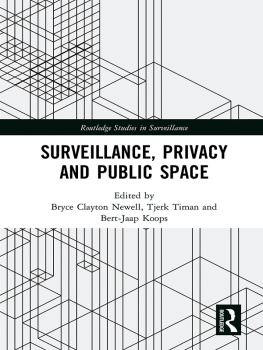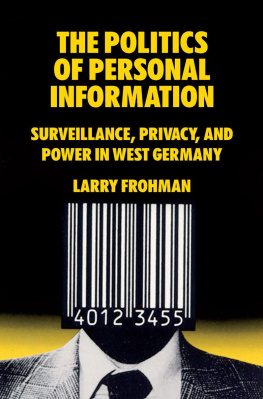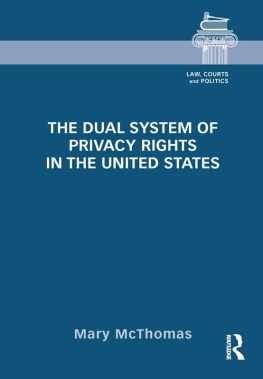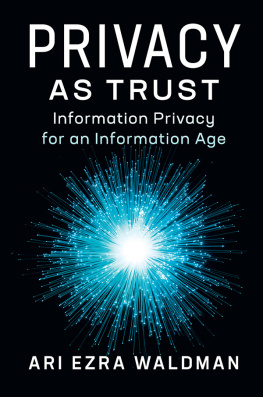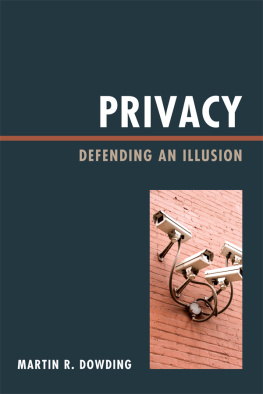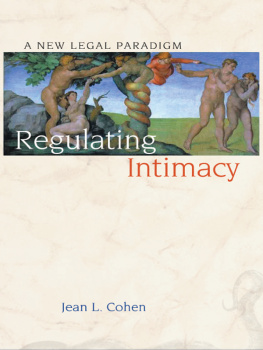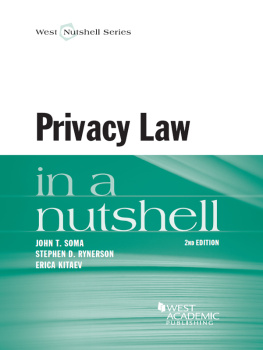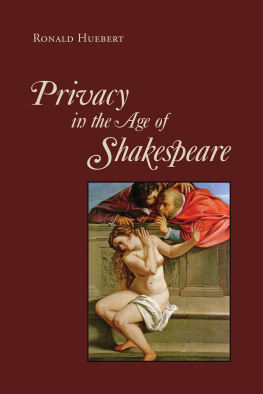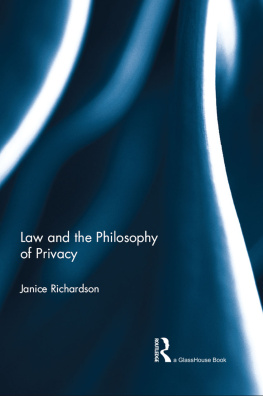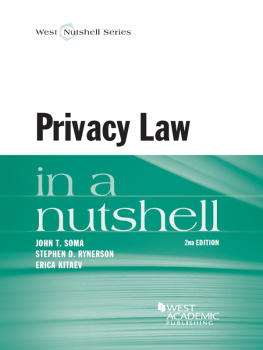The Closet and the Cul-de-Sac
POLITICS AND CULTURE IN MODERN AMERICA
Series Editors
Margot Canaday, Glenda Gilmore, Matthew Lassiter,
Stephen Pitti, Thomas J. Sugrue
Volumes in the series narrate and analyze political and social change in the broadest dimensions from 1865 to the present, including ideas about the ways people have sought and wielded power in the public sphere and the language and institutions of politics at all levelslocal, national, and transnational. The series is motivated by a desire to reverse the fragmentation of modern U.S. history and to encourage synthetic perspectives on social movements and the state, on gender, race, and labor, and on intellectual history and popular culture.
The Closet and the Cul-de-Sac
The Politics of Sexual Privacy in Northern California
Clayton Howard

Copyright 2019 University of Pennsylvania Press
All rights reserved. Except for brief quotations used for purposes of review or scholarly citation, none of this book may be reproduced in any form by any means without written permission from the publisher.
Published by
University of Pennsylvania Press
Philadelphia, Pennsylvania 19104-4112
www.upenn.edu/pennpress
Printed in the United States of America on acid-free paper
10 9 8 7 6 5 4 3 2 1
Library of Congress Cataloging-in-Publication Data
Names: Howard, Clayton, author.
Title: The closet and the cul-de-sac : the politics of sexual privacy in Northern California / Clayton Howard.
Other titles: Politics and culture in modern America.
Description: 1st edition. | Philadelphia : University of Pennsylvania Press, [2019] | Series: Politics and culture in modern America | Includes bibliographical references and index.
Identifiers: LCCN 2018044568| ISBN 9780812251241 (hardcover : alk. paper) | ISBN 0812251245 (hardcover : alk. paper)
Subjects: LCSH: Privacy, Right ofCaliforniaHistory20th century. | Sexual rightsCaliforniaHistory20th century. | Gay rightsCaliforniaHistory20th century. | SuburbanitesCaliforniaSocial conditionsHistory20th century.
Classification: LCC JC596.2.U5 H69 2019 | DDC 323.44/8097940904dc23
LC record available at https://lccn.loc.gov/2018044568
To Catherine
Contents
In October and November 1978, an unlikely duo went on tour in California together. That year, openly gay San Francisco Supervisor Harvey Milk met State Senator John Briggs, a conservative from suburban Orange County, to debate a ballot initiative that aimed to ban openly gay teachers in Californias public schools. The measure, alternately known as Proposition 6 or the Briggs Initiative, was the first statewide referendum on gay rights in U.S. history, and the two politicians fought over the issue in community centers, television studios, and school gyms across the state. Briggs predicted the ban would spark a conservative revival that would draw a moral line against homosexuality, while Milk later declared, Gay people can never go back into their closets. Together, the pair seemed like divergent responses to the sexual revolution of the 1960s and 1970s and embodied two of the most important social movements of the late twentieth century: Gay Liberation and the Religious Right. Progressive versus conservative, urban versus suburban, and gay versus straight, the debates over Proposition 6 could easily be seen as some of the opening shots of the coming culture wars over homosexuality.
Yet the conflicts over gay rights were never just a struggle between two sides of the political spectrum. Instead, the culture wars included a wide range of people beyond the two social movements. They included activists and policymakers, to be sure, but also married men and women who supported gay rights because they desired privacy in their own bedrooms and straight-identified Americans who never joined the Religious Right but who disliked homosexuality. In 1978, approximately 60 percent of Californians lived in suburbs, and while Briggs found enthusiastic support in some of the conservative megachurches along the states highways, not all suburbanites agreed with him.
The history of the culture wars is best comprehended, then, not as a two-sided fight over the legacy of the sexual revolution but as a multisided debate over the boundaries of the closet. Most Americans have primarily understood the culture wars as a dispute about the definition of privacy. In the late twentieth and early twenty-first centuries, people across the political spectrum saw sexual privacy as a fundamental right, yet majorities also believed heterosexual marriage was superior to other kinds of relationships. Confronted with the gay rights movement of the late twentieth century, many straight-identified people struggled to define the right to privacy and the extent to which society should accept homosexuality. They argued about where and when openly gay, lesbian, or bisexual people should express their sexuality and how much public officials should tolerate same-sex relationships. In these debates, straight-identified Americans sometimes argued that the government should respect the private lives of all of its citizens and in other cases that gay relationships violated their own right not to know what others allegedly did in their bedrooms. The specific language of privacy appealed to so many, in part, because it seemed like common sense, and partisans used the same language to support numerous positions. Invocations of the term could justify eliminating discrimination against gay men and lesbians, compelling them to conceal their identities, or both.
The contours of how this discourse worked can be seen in the debate over the Briggs Initiative. The Bay Area Committee Against the Briggs Initiative warned in 1978 that Proposition 6 would authorize the government to regulate the private lives... of teachers outside the school.
The outbreak of the culture wars in the 1970s thus signaled neither the arrival of total equality for gay men and lesbians nor the opening of a uniquely conservative period in American politics. The question of homosexuality surfaced again and again in the late twentieth and early twenty-first centuries. Proposition 6 ultimately failed at the polls, but its sponsor made at least one accurate prediction: Homosexuality, Briggs declared, is the hottest social issue since Reconstruction. In subsequent decades, gay rights activists and religious conservatives became seemingly permanent and linked fixtures in national politics, clashing over topics such as the AIDS crisis, gays in the military, and same-sex marriage. Their prominent place in the culture wars, in fact, even prompted a pair of journalists to dub the social movements Perfect Enemies in 1996.
Yet, like the Briggs Initiative, almost all of these battles hinged on the question of privacy, and the moderate consensus developing around the idea of privacy influenced their outcomes to a significant extent. Though employed to dramatically different ends, the discourse united people across the culture wars, and Americans used it to justify pushing gay men and lesbian back into the closet as often as they used it to combat prejudice. At the height of the clashes over same-sex marriage in the early 2000s, for example, the San Franciscobased National Center for Lesbian Rights alleged that gay marriage bans violated same-sex couples right to privacy.
Privacy and the Legacy of the Straight State
The durability of the conflicts over gay rights and the particular interest in privacy are the contested legacies of the states support for heterosexuality and marriage in postwar America. In the two decades after World War II, adults publicly involved in normative straight relationships, particularly heterosexual marriage, enjoyed the fullest benefits of American citizenship, while those who engaged in sex with others of the same sex risked social isolation, economic deprivation, and legal prosecution. Government authorities had regulated Americans sex lives before the 1940s, but the war spurred the creation of a new legal regime that tightened earlier policing strategies, specifically targeted homosexuality, and promoted heterosexuality as a form of mental health. The conflict, however, also served as an important watershed for Americans with normative sexual identities. Politicized by what they saw as the chaos of the war years, many Americans in urban centers petitioned public officials to protect what they saw as normal family life, and authorities responded by rewarding people for marrying and by penalizing those who broke sexual norms.
Next page

